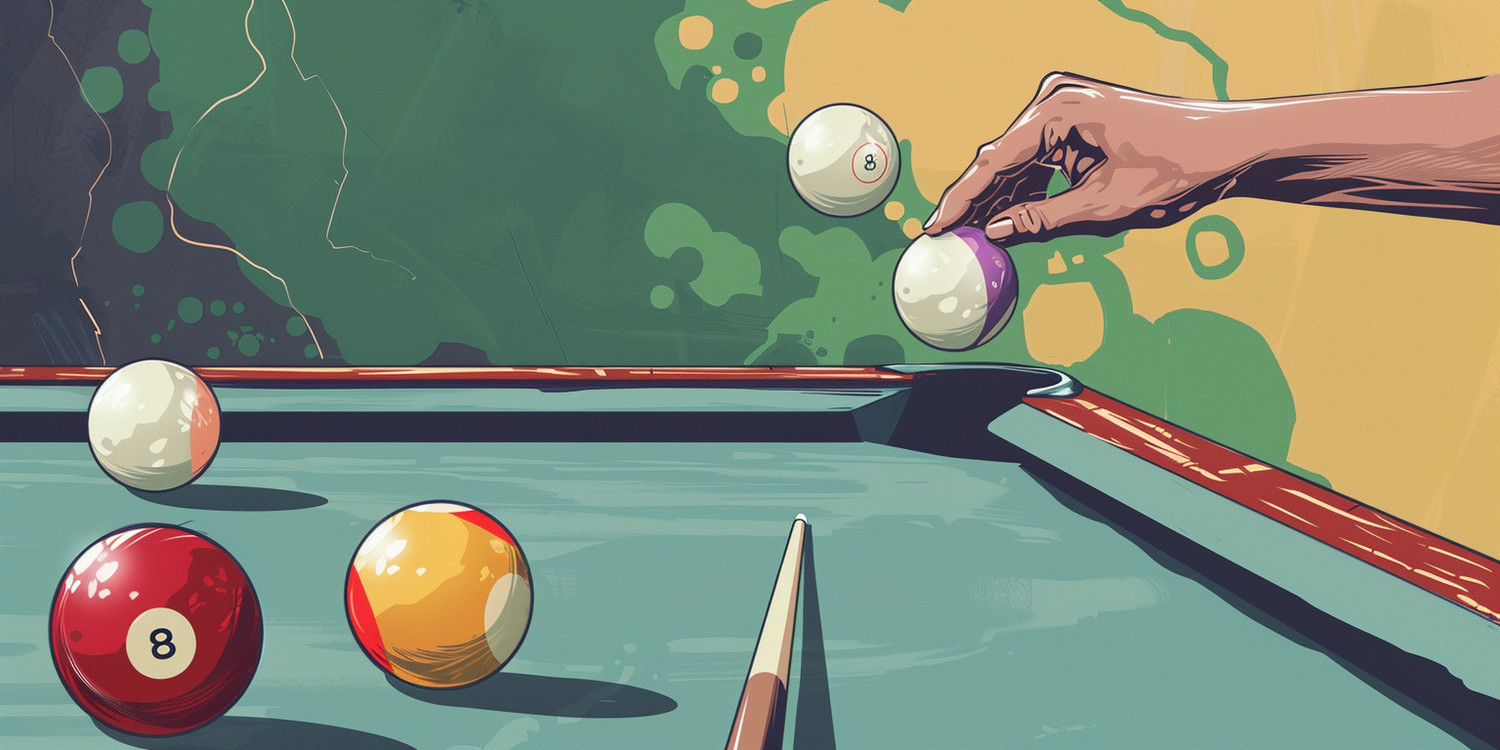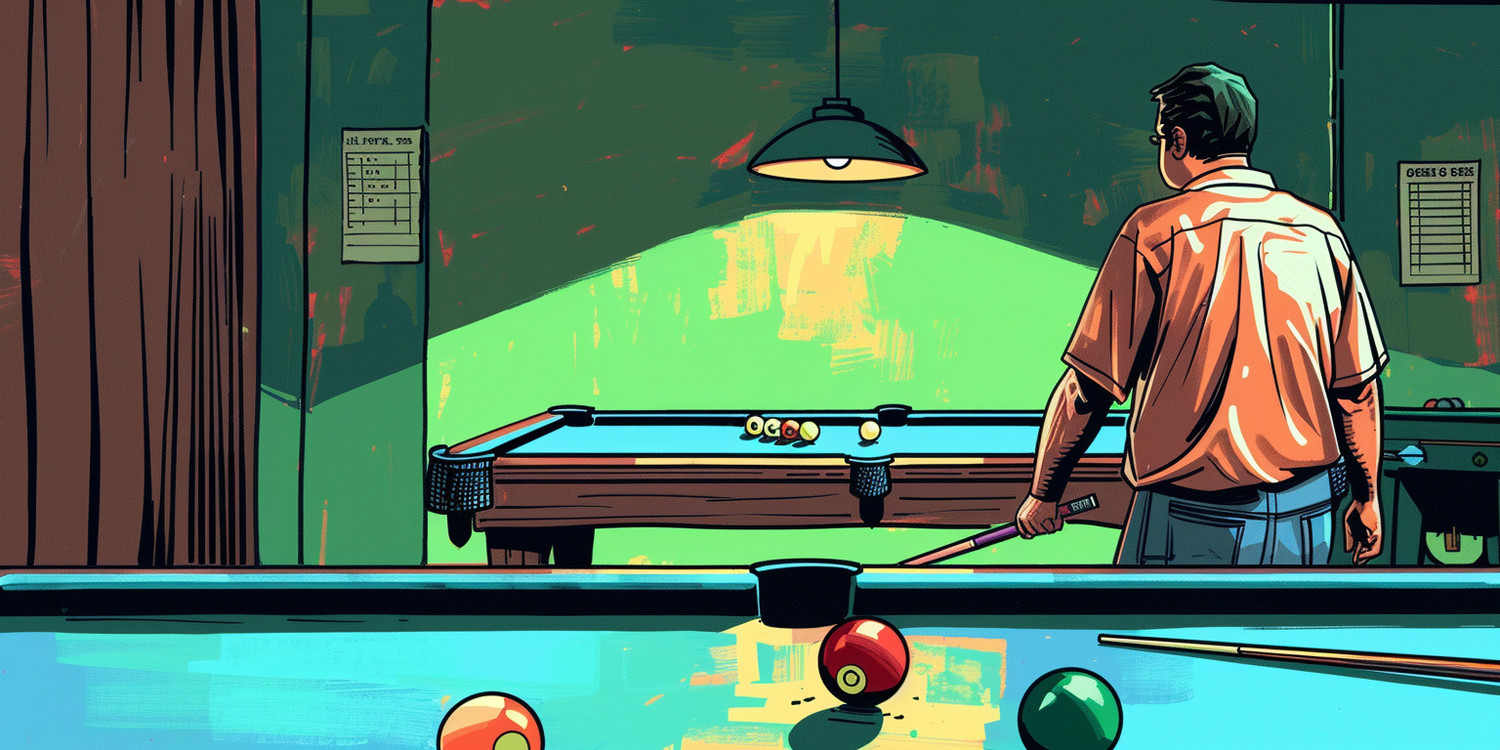
The game of pool transcends mere physical skill; it necessitates a robust mental fortitude. Stress, anxiety, and pressure exert a substantial influence on performance. Mastery of the mental aspects constitutes a critical determinant of success, demanding dedication, focus, and mental toughness.
Pre-Shot Routine and Visualization
A consistent and purposeful pre-shot routine constitutes a cornerstone of effective pool playing. Prior to execution, players should meticulously visualize the intended trajectory and outcome of each shot. This process involves a comprehensive mental rehearsal, wherein the player anticipates the cue ball’s path, the object ball’s destination, and any potential obstacles or contingencies that may arise. Such visualization techniques serve to enhance focus, minimize distractions, and instill a sense of confidence in one’s abilities.
The pre-shot routine should be deliberate and methodical, encompassing elements such as stance alignment, grip adjustment, and aiming precision. By adhering to a consistent routine, players can establish a sense of familiarity and control, mitigating the impact of pressure or anxiety. Furthermore, visualization aids in the development of kinesthetic awareness, allowing players to refine their technique and improve their shot-making accuracy.
Effective visualization extends beyond simply picturing the desired outcome; it also involves mentally simulating the physical sensations associated with the shot. Players should endeavor to feel the smoothness of their stroke, the contact between the cue ball and object ball, and the resulting movement of the balls across the table. This multi-sensory approach enhances the realism of the visualization, making it a more potent tool for improving performance.
Maintaining Focus and Managing Pressure

In the realm of competitive pool, the ability to maintain unwavering focus and effectively manage pressure stands as a paramount determinant of success. The inherent nature of the game, characterized by moments of high stakes and intense scrutiny, necessitates the cultivation of mental resilience and composure. Players must develop strategies to mitigate distractions, regulate their emotional responses, and sustain optimal concentration throughout the duration of a match.
One effective technique for maintaining focus involves the implementation of mindfulness practices. By consciously directing attention to the present moment, players can minimize the intrusion of extraneous thoughts and anxieties. This may involve focusing on the physical sensations of gripping the cue, the visual cues of the table, or the auditory cues of the balls colliding. Cultivating a heightened awareness of the present allows players to remain grounded and centered, even in the face of adversity.
Managing pressure requires a proactive approach to emotional regulation. Players must learn to recognize the physiological and psychological signs of stress, such as increased heart rate, muscle tension, or negative self-talk. Once identified, these symptoms can be addressed through various coping mechanisms, including deep breathing exercises, positive affirmations, or visualization techniques. By proactively managing their emotional state, players can prevent pressure from overwhelming their performance and maintain a clear, rational mindset.
Strategic Thinking and Mind Games
Strategic thinking forms an indispensable facet of proficient pool playing, extending beyond the mere execution of shots. It encompasses the ability to analyze the table layout, anticipate potential outcomes, and formulate a comprehensive game plan. This involves a meticulous assessment of ball positions, angles, and obstacles, coupled with a deep understanding of the game’s principles and rules. The capacity to discern the optimal sequence of shots, while considering both offensive and defensive strategies, distinguishes a seasoned player from a novice.
Furthermore, the realm of pool is not devoid of psychological maneuvering, often referred to as “mind games.” These subtle tactics aim to gain a mental edge over the opponent, potentially disrupting their focus, instilling doubt, or influencing their decision-making process. Mind games can manifest in various forms, ranging from subtle verbal cues to calculated pauses or deceptive body language. While the ethical implications of certain mind games may be debatable, their prevalence in competitive pool underscores the significance of mental fortitude and the ability to remain composed under pressure.
Effective strategic thinking also necessitates adaptability and improvisation. The dynamic nature of a pool game often requires players to deviate from their initial plans, adjusting their strategies based on unforeseen circumstances or changes in the table layout. This adaptability demands a flexible mindset, coupled with the ability to quickly assess new situations and formulate alternative solutions. The integration of strategic thinking and mental resilience empowers players to navigate the complexities of the game with confidence and precision.
Mental Toughness and Emotional Control

Mental toughness, a cornerstone of success in competitive pool, embodies the unwavering resilience and fortitude required to overcome adversity, maintain composure under pressure, and persevere through challenging circumstances. It is the ability to remain focused and determined, even when faced with setbacks, unfavorable table layouts, or formidable opponents. Coupled with emotional control, mental toughness enables players to regulate their reactions, prevent emotional outbursts, and maintain a rational mindset throughout the duration of a match.
Cultivating mental toughness involves a multifaceted approach, encompassing self-belief, positive self-talk, and a proactive mindset. Players must develop an unwavering conviction in their abilities, reinforcing their confidence through affirmations and visualization techniques. Replacing negative or self-defeating thoughts with positive and encouraging self-talk can significantly enhance performance and resilience. Furthermore, adopting a proactive approach, focusing on solutions rather than dwelling on problems, fosters a sense of control and empowers players to overcome obstacles.
Emotional control, an integral component of mental toughness, necessitates the ability to regulate emotional responses and prevent them from negatively impacting performance. This involves recognizing the physiological and psychological signs of emotional distress, such as increased heart rate, muscle tension, or negative self-talk, and implementing strategies to mitigate their effects. Techniques such as deep breathing exercises, mindfulness practices, or visualization can help players regain composure and maintain a clear, rational mindset, even in the face of intense pressure or frustration.
Seeking Professional Guidance: Sports Psychology
For individuals seeking to elevate their pool game beyond the realm of physical skill, the guidance of a qualified sports psychologist can prove invaluable. Sports psychology, a specialized field dedicated to enhancing athletic performance through the application of psychological principles, offers a comprehensive framework for addressing the mental and emotional aspects of the game. By collaborating with a sports psychologist, players can gain access to evidence-based strategies and techniques designed to optimize focus, manage pressure, and cultivate mental resilience.
A sports psychologist can assist players in identifying and addressing specific mental barriers that may be hindering their progress. These barriers may include anxiety, self-doubt, lack of focus, or difficulty managing emotions. Through individualized assessments and tailored interventions, a sports psychologist can help players develop coping mechanisms, enhance their self-confidence, and improve their overall mental game. Furthermore, they can provide guidance on developing effective pre-shot routines, visualization techniques, and strategies for maintaining composure under pressure.
The benefits of sports psychology extend beyond the improvement of individual performance; they can also foster a more positive and enjoyable experience of the game. By addressing the psychological aspects of pool, players can cultivate a greater sense of self-awareness, enhance their emotional regulation skills, and develop a more resilient mindset. This, in turn, can lead to increased satisfaction, reduced stress, and a more sustainable approach to the game, allowing players to reach their full potential and enjoy the process of continuous improvement.

